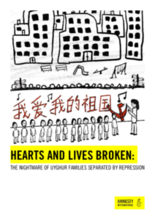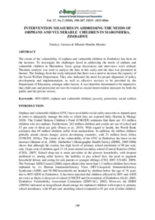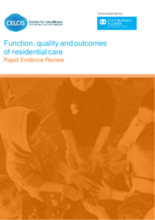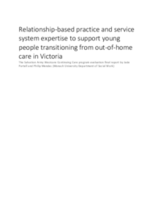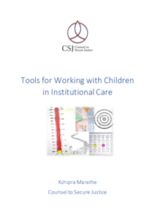Demographic Data
|
Sources: World Bank, UNICEF,UNDP HDR 2015, DHS 2014 |
Displaying 4951 - 4960 of 14391
This issue of the Future of Children focuses on the first years of life starting with in utero experiences.
This report from Amnesty International presents testimonies from six parents residing in Australia, Canada, Italy, the Netherlands and Turkey who have been separated from their children, who are "trapped" in China.
With 30 years since the adoption of the African Charter on the Rights and Welfare of the Child, this article discusses how the Charter has contributed to understanding and addressing children's rights to protection.
To investigate the challenges faced in addressing the needs of orphans and vulnerable children in Marondera, focus group discussions and interviews were utilised. Thematic analysis was used to analyse the data in this study and the data was presented in themes.
Целью является исследование особенностей правового регулирования договорной опеки (попечительства) над несовершеннолетними детьми в современной России.
This review seeks to provide an overview of the existing research on residential care, including the function of residential care, what facilitates 'quality' care in residential care, and what effect residential care has upon outcomes for children and young people.
This paper is a condensed version of a study entitled “Beyond 18: Leaving Child Care Institutions - Supporting Youth Leaving Care: A Study of Aftercare Practices in Five States of India”, which found that upon turning 18, youth transitioning out of child care institutions to independent life in India experience many challenges, such as securing housing and identity documents; accessing education, skill development, and employment opportunities; and garnering psychosocial support.
This report presents the latest findings from the Growth Beyond the Town Girls and Boys Town South Africa (GBTSA)/University of Johannesburg (UJ) joint partnership longitudinal research study. Presented are the findings from 150 participants who were interviewed as they disengaged from GBTSA, as well as the outcomes of many of these care-leavers that have been measured each year during follow-up interviews.
This is the final report of the evaluation of the Salvation Army Westcare Continuing Care Program, which aimed to provide relationship-based support to assist the planning, preparation and support needs of young people during their transition from out-of-home care (OOHC) to independent living.
This knowledge resource discusses and provides examples of practice tools and calming techniques (in English and Hindi) which counsellors and adults can use while working with children who are in institutional care. The paper reviews evidence on the impact of institutionalisation on children as well as evidence-based interventions that can help mitigate this impact.


